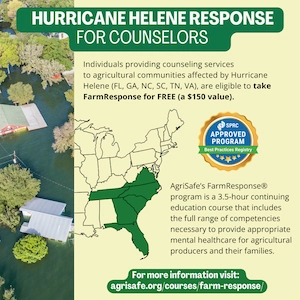Last updated on November 27th, 2024 at 09:11 am
Be aware of flood hazards no matter where you live, but especially if you live in a low-lying area, near water or downstream from a dam. Floodwater can be contaminated by pollutants including sewage, human and animal feces, pesticides and insecticides, fertilizers, oil, asbestos, rusting building materials, and more. While most public attention is focused on property loss caused by floods, protecting your own health is more important. Although there are no guarantees of safety during a flood, you can take actions to protect yourself.
Chemicals
If a chemical, pesticide or hazardous waste spill occurs, chemicals might be released from barns, homes, and other sources into the environment. Chemical spills could release vapors or chemical fumes. Learn more about chemical safety from AgriSafe.
Heat Related Illnesses
Disaster recovery is physically strenuous, especially in hot temperatures. Intense heat exposure can cause heat-related illnesses. Signs include excessive thirst, weakness, headache, loss of consciousness, nausea and vomiting, muscle cramps, and dizziness.
Livestock
Floods can potentially increase the transmission of communicable diseases: Water-Borne (Hepatitis A); Vector-Borne (West Nile Virus); Bacterial (Tetanus) spores and Fungal (Histoplasmosis) spores found in dust, dirt, animal droppings and animal carcass.
Mental Stress
After a natural disaster, you’re dealing with the extra stress of current conditions, along with the daily stress of farm and ranch operations. Natural disasters such as floods create a tremendous amount of additional stress and anxiety. You may develop major depression, generalized anxiety, and posttraumatic stress disorder. Learn more about mental health from AgriSafe.
Mold
Mold is part of the natural environment. Higher concentrations of mold and bacteria can be found after a flood. This causes the production of Microbial Volatile Organic Compounds (mVOCs), which emit chemical-like odors and can become noxious respiratory irritants. Learn more about respiratory health best practices from AgriSafe.
What You Can Do to Protect Your Respiratory Health During Disaster Cleanup – CDC Resource
Water Sources
Water may not be safe to drink, cook or clean with after a flood. Water can become contaminated with microorganisms such as bacteria, sewage, heating oil, agricultural or industrial waste, chemicals and other substances that can cause serious illness.
How to Disinfect Wells After an Emergency – CDC Resource
Flood Resources
Documents
Webinars
Page updated: November 2024

